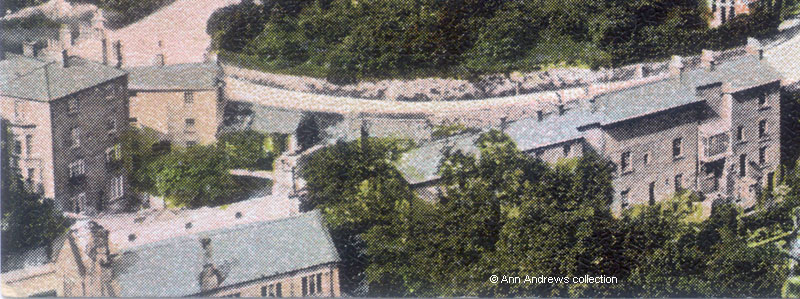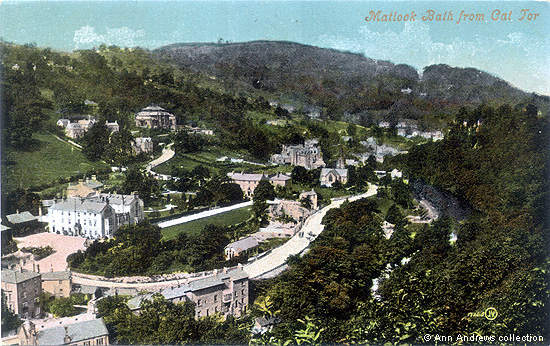|
Images Index> Matlock Bath, 20th and 21stC Images> This page |
| Matlock Bath from Cat Tor |
| Matlock Bath : Twentieth Century Photographs, Postcards, Engravings & Etchings |
|
|||
|
The New Bath is one of Matlock Bath's oldest hotels, of course. In the gardens is a huge tree - the outdoor swimming pool was eventually built in the area next to this tree. At the far end of the garden is what used to be the Bath Terrace or Walker's Hotel; by 1898 the two hotels were under the same ownership[1]. Holy Trinity Church is further along Derby road, towards the centre of the village, and behind stands the relatively newly built Royal Hotel. The hill in the distance is the Heights of Abraham and the white building high on the hillside is the Upper Tower. The houses at the top of Clifton Road include Dovedale House, at the time home of Mr. Rowland of Matlock Bath school, and the house where the web mistress lived as a young girl. On the same level as the houses is the domed Royal Pavilion, re-branded as the Palais Royal in 1923. The old Pavilion was made of glass and was opened in 1884 by Lord Edward Cavendish. It featured a terrace that was 228 feet long and had extensive landscaped grounds. The entrances were from Clifton Road, now blocked up, and Temple Walk. A band performed twice daily at the old Pavilion throughout the season. A sepia version of this card was one of the very first images included
on the Matlock and Matlock Bath website and can
still be seen on the site. |
|||
 |
|||
|
|||
|
Postcard, "Matlock Bath from Cat Tor", is one of the Valentines Series, No. 17465, first registered in 1892. Postcard in the collection of, provided by and © Ann Andrews. Researched, written by and © Ann Andrews. Intended for personal use only. |
|||
References (coloured links are to more information elsewhere on this web site): [1] The New Bath Hotel Company was formed in 1898 ("Derbyshire Times", 5 March 1898) and the Bath Terrace was under the same ownership ("Derbyshire Times", 6 August 1898). [2] Adam, W. (1838) "The Gem of the Peak; or Matlock Bath and Its Vicinity. ..." London; Longman & Co., Paternoster Row ; ... Mawe, Royal Museum, Matlock ; .... This was the first edition of his guide. [3] Reminiscences of the late Mr. Frank
Clay, from his private papers and notes owned by the web mistress. |
|||








 The petrifying well is mentioned in the
The petrifying well is mentioned in the